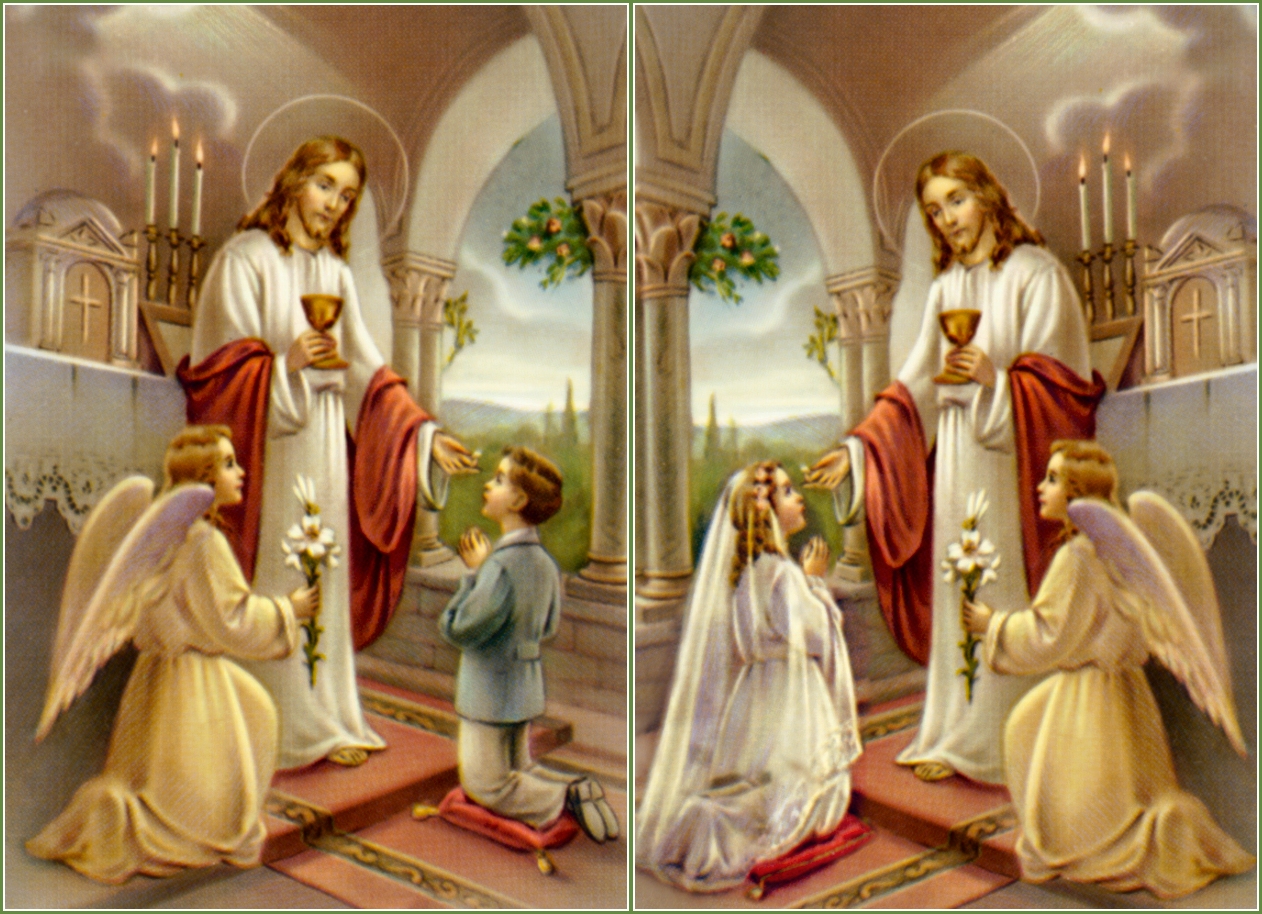

TAKEN FROM MY LEADER IN LIFE
FR. GEORGE BURNS, S.J.
Burns, Oates & Washbourne, LTD.
London, 1942
With Nihil Obstat and Imprimatur, 1942
Your supernatural life needs its constant and suitable nourishment. This is chiefly given in the Sacrament of Our Lord's Body and Blood. There is nothing the devil detests more than Holy Communion. He employs every means to hinder it. We read of this in the 10th chapter of the 3rd Book of the Imitation of Christ:
"The enemy, knowing the very great fruit and remedy contained in Holy Communion, striveth by every effort and occasion, as far as he is able, to withdraw and hinder devout persons from it."
If you do not wish to be taken in his snares, you must determine beforehand and resolve not to allow yourself to be turned aside by any of his suggestions. You should have recourse always to the rule of the Church: the state of grace and a right intention. The right intention consists, she tells us, in communicating, not from habit, nor from vanity or worldly motives, but in order to please God, to unite ourselves more completely with Him by charity, and to oppose this Divine remedy to our infirmities and faults. If you fulfill these conditions, go to Our Lord without fear, and daily.
Many have begun well as children, but become victims to the delusions of the devil, have abandoned frequent Communion.
Holy Communion and resistance to sin.
Listen to the words of St. Thomas Aquinas: "Sin is to the soul a sort of spiritual death. Now, one preserves the body from natural death by fortifying the system by means of nourishment and remedies, or by protecting it against attacks from without. So the Blessed Eucharist is to the soul at once a nourishment, a remedy, and a shield against the assaults of the devil."
Holy Communion and sacrifice.
It exacts and inspires sacrifice. How many victories has the Communicant often to win over himself that he may come to Our Lord---the earlier rising, the extra prayers, the walk to Church, efforts to preserve purity of heart, the struggle against human respect and apathy of parents and friends, etc. It is in Communion above all that one hears the call of Our Lord to a greater fidelity to daily duties, to a more complete renunciation of self, to a more generous devotion.
"Many persons communicate frequently," says St. Alphonsus Liguori, "and yet draw but little fruit from their Communions, because they remain but a short time with Jesus Christ."
VIEW AN IMAGE OF THE CRUCIFIXION-PRECIOUS BLOOD WITH LAMBS
That is, they make little or no "Thanksgiving'" after Holy Communion.
The elements of a good Thanksgiving are:
ADORATION: "giving yourself" to Jesus.
LOVE: short prayers to His Sacred Heart.
THANKS: for all graces---for suffering also.
ASKING: for others first, then for yourself.
REPARATION: for your sins and the sins of the world.
The initials of these five points spell ALTAR.
Death is not a sad thought for a Christian, it can be the entrance to Heaven! So think when you go to Communion along these lines:
1. Death we know is inevitable. Yet it is only terrible:
(a) If I am in mortal sin.
(b) If Jesus Christ is not my friend.
(c) If I can look back over a wasted life.
2. So at the hour of death my great desire will be:
(a) To be in the friendship of Jesus Christ.
(b) To have Him come in Viaticum, to take me safely through death to eternal life.
(c) To have with me in death, my future-judge as a friend.
3. Yet when I do come to die, I may be weak, unconscious, perhaps struck down by an accident and unable to use Viaticum as I should. So I shall use today's Holy Communion as if it were my last.
4. I make an act of resignation to my death, in whatever form it may come.
5. I beg that when death arrives there may be no mortal sin on my soul, and that Christ may be my friend.
6. I express sorrow for sin as I should like to do on my bed of death with Judgment just ahead.
7. I plead with the Judge, Christ present in my heart, to lead me safely through death into life, and to be merciful to me when my judgment comes.
8. I place my hand in His Hand, knowing He will lead me safely into eternity.
PENANCE (or "CONFESSION").
I. Though the obligation of Confession extends only to mortal sin, the penitent should confess every deliberate offense whatever, in order to obtain great purity of conscience and an abiding spirit of penance. The habit of going to confession at least every fortnight satisfies for gaining those indulgences which prescribe "confession" as one of the conditions. [1]
II. Go to Confession often, not only to obtain remission of present offenses, but also to deepen your sorrow for the past; to obtain a sincerer sympathy for Our Lord in His Sacred Passion, and the grace to persevere. If you have, by the mercy of Our Lord, only venial sins to confess, mention some sin of your past life in order to make sure of receiving sacramental grace.
III. Make a good preparation; not so much by a mathematical examination of your conscience as by conceiving a horror of sin and a deep sorrow of having offended the infinitely good GOD. Whilst the priest pronounces the words of absolution, make a fervent act of contrition, and afterwards a good thanksgiving, adding prayers and penances to your sacramental penance, which is not ordinarily an adequate one but, as it were, an earnest or first-fruits of what is to come, here or in Purgatory.
IV. There are two kinds of sorrow: "attrition" springing from some imperfect, though supernatural, motive---this is sufficient, with the Sacrament of the tribunal, for salvation; and "contrition" springing from the motive of pure love of God. Should you ever have the misfortune of falling into mortal sin, make at once an act of contrition; this, which includes the intention of afterwards confessing the sin in the sacred tribunal, justifies the soul before God, and that instantly. No one need ever remain for a moment in a dangerous state of enmity with His Divine Majesty, whose gate of mercy is always open in this life.
V. If possible, keep to a fixed confessor and form a habit of going on a certain day. (But this is not always possible and, sometimes, not even advisable.)
VI. Remember again, that the priest is there to help you.
AN ACT OF CONTRITION
O my God, I am heartily sorry for having offended Thee, and I detest all my sins, because I I dread the loss of heaven and the pains of Hell, but most of all because they offend Thee, my God, Who art all-good and deserving of all my love. I firmly resolve, with the help of Thy grace, to confess my sins, to do penance and to amend my life. Amen.
1. Daily Communicants are not bound now by this fort-nightly confession in order to gain such indulgences (Decree, Feb. 14, 1906.)
 E-MAIL
E-MAIL
HOME-------------------CATECHISM
www.catholictradition.org/Children/holy-communion3.htm